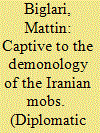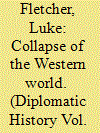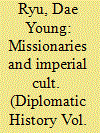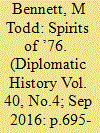|
|
|
Sort Order |
|
|
|
Items / Page
|
|
|
|
|
|
|
| Srl | Item |
| 1 |
ID:
147563


|
|
|
|
|
| Summary/Abstract |
Making use of recently declassified documents, in this article I examine the U.S. government’s perceptions about Shi’a Islam during the time of the Iranian revolution, 1978–9. I show how lower ranking officials in diplomatic and intelligence circles came to the common conception of Shi’ism as being a uniquely populist religion with an inherent propensity towards revolutionary instability, as demonstrated in its doctrines, rituals and history. These perceptions influenced higher levels of government, including President Carter himself. I then explore how analysts and policymakers conceptualized the religious leadership in Iran, especially Khomeini. I show that although opinion was divided about whether Khomeini represented U.S. interests, the prevailing view was to oppose him because of his populist tendencies empowering the Iranian masses, which senior policymakers had come to see as integral to Shi’ism itself. As a result, I argue, although the wider Cold War context dictated the U.S. government’s attempt to maintain diplomatic relations with the new Iranian regime in 1979, this was to be done without overtures to Khomeini, long before the Hostage Crisis.
|
|
|
|
|
|
|
|
|
|
|
|
|
|
|
|
| 2 |
ID:
147568


|
|
|
|
|
| Summary/Abstract |
This article examines the thoughts and plans of Dean Acheson and Paul Nitze that led them to the development of NSC 68, the National Security Council document of 1950 that called for rearmament of Europe and solidified the Cold War. It argues that neither the post-1952 European dollar shortage nor the danger of a land invasion of Western Europe were as important to the NSC 68/rearmament decision as the more immediate fear that Germany and/or other European allies were losing their desire to remain in the US-led world-system. The organizing logic of NSC 68 was one of hegemony, which, was neither merely military, economic nor political, but always all three at once. The world system envisaged by Acheson would simply not work, he feared, without the industrial core of central Europe firmly within it; and the principal aim of NSC 68 was to bind Germany to the “free world.”
|
|
|
|
|
|
|
|
|
|
|
|
|
|
|
|
| 3 |
ID:
147569


|
|
|
|
|
| Summary/Abstract |
On October 14, 1964, Leonid Brezhnev, Aleksei Kosygin, and Nikolai Podgornii
deposed Premier and First Secretary of the Communist Party of the Soviet Union
(CPSU) Nikita Khrushchev in a palace coup.1 Unthinkable during Stalin’s regime,
this bloodless ouster exemplified the new phase in the Cold War to which
Khrushchev himself had contributed.2 Outside the Soviet Union, the
incorporation of West Germany into the North Atlantic Treaty Organization
(NATO), the successful conclusion of the Cuban and Berlin crises, and the
Limited Test Ban Treaty demonstrate that the Cold War had become a competition
between two essentially status quo, risk-averse powers over the course of Khrushchev’s
time in office.3 Lyndon Johnson’s presidency is not remembered as a moment that
ushered in a new era of U.S.-Soviet rapprochement;
|
|
|
|
|
|
|
|
|
|
|
|
|
|
|
|
| 4 |
ID:
147565


|
|
|
|
|
| Summary/Abstract |
This article proposes that U.S. foreign relations in the nineteenth century were structured around the transnational interconnections of American communities overseas. The diplomacy of Britain’s American community during the Civil War refocuses historian’s attention on the offshore institutions and civic life that conditioned American public diplomacy throughout the nineteenth century.
|
|
|
|
|
|
|
|
|
|
|
|
|
|
|
|
| 5 |
ID:
147564


|
|
|
|
|
| Summary/Abstract |
State Shinto was established in colonial Korea to assimilate the Korean population. Although the Japanese government declared the Shinto ceremonies as non-religious, patriotic rituals, they consisted of traditional Shinto rites. When the Japanese authorities began forcing attendance at Shinto shrine rites, two American Presbyterian missions in Korea refused to cooperate. Their uncompromising attitude enraged the Japanese authorities, and embarrassed the American diplomatic establishment and accommodative members of the missionary community. As the Shinto shrine issue developed into a public controversy, American diplomats had to protect the national priorities over and against the private interests of missionaries.
|
|
|
|
|
|
|
|
|
|
|
|
|
|
|
|
| 6 |
ID:
147566


|
|
|
|
|
| Summary/Abstract |
Drawing on public and private archives in the United States, Britain and Armenia, this article assesses the Anglo-American response to the Armenian Question as an illuminating but neglected window into the United States’ rise to world power, the decline of the British Empire and the origins of the League of Nations. The Armenian Question, relating to the security and independence of the Armenian subjects of the Ottoman Empire, was a humanitarian cause célèbre at the turn of the 20th century. The search for its solution was at the center of an American, and wider international, debate over the world role of the United States. Previous studies have not appreciated the significance of this solution to the larger public debate over the nature and purpose of U.S. power. Above all, whether the United States should join with the British Empire to construct a new global order.
|
|
|
|
|
|
|
|
|
|
|
|
|
|
|
|
| 7 |
ID:
147567


|
|
|
|
|
| Summary/Abstract |
An underappreciated bright spot in the otherwise bleak 1970s, the 200th anniversary of the American Revolution presented the United States with an opportunity to recapture some of the moral authority it squandered in Vietnam. The memory of the Revolution, not to mention the Declaration of Independence, remained alive and well in the world two centuries later, providing the United States with a durable source of prestige. U.S. public diplomats recalled the memory of 1776 in an effort to rebrand America in 1976. This article recalls that initiative, which speaks to the management of America's portrait in the global 1970s as well as the operability of commemorative diplomacy in international affairs.
|
|
|
|
|
|
|
|
|
|
|
|
|
|
|
|
|
|
|
|
|